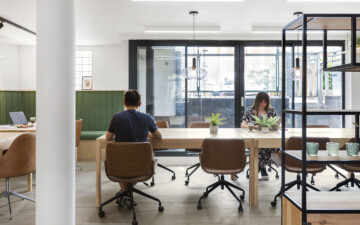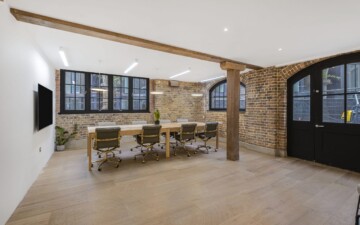Work from home (WFH) was the exception, not the norm before 2020. Not surprisingly, according to a 2020 Labour Market Survey (LMS), 57.2% of people living in London did some work at home as a result of the COVID-19 pandemic. Today, as lockdowns ease and people gingerly return to pre-pandemic ways of living, work-life doesn’t look ready to revert to the pre-2020 state. Indeed, the COVID-19 and ensuing restrictions reshaped work-life and workplaces, effecting irrevocable changes that are here to stay. But while the future of permanently working from home in the U.K. in 2022 appears slightly unclear, the relatively new trend of “hybrid working” appears to have caught on. According to a 2021 Vox survey, more than 70% of UK employees would prefer a hybrid model of work that allows them the flexibility of working at office on certain days of the week and working from home on others. Given the burgeoning popularity of this new work culture, employers are increasingly veering towards co-working spaces. So what are co-working spaces and why are they best suited to meet the requirements of a hybrid working force?
Why Co-Working Spaces Offer the Perfect Solution
Simply stated, a co-working space is a space that is designed to harmoniously accommodate workers from different organisations, ensuring convenience and cost savings through the use of common infrastructure and utilities. Co-working spaces have gained popularity post-COVID primarily on account of a shift in the way companies function. With a large number of companies opting for hybrid work, employees are no longer working at the office 5 days a week, prompting a rethink with regard to space considerations. Moreover, every co-working setup affords a generous measure of flexibility, allowing employees from different locations to collaborate in person at least occasionally. Best of all, choosing a co-working office makes better financial sense for small and medium businesses that aren’t sure of their office plans.
Working from Home vs. Working in a Co-working Space
While employees are increasingly being offered the opportunity to work remotely, many organisations are realising that their workers can be more productive if they enjoy flexibility with regard to their location. Here’s a table comparing the features of the two modes of working.
| Working from Home |
Working in a Co-working Space |
| Saves time and money spent on commute. |
No saving of money & time on office-working days. |
| High chances of getting distracted by household chores. |
Peaceful and professional environment, conducive to work. |
| Can get lonely and exhausting. |
Great for networking, collaborating, and discovering new opportunities. |
| Work could get affected as a result of poor internet connection, uncomfortable chairs, limited lighting, and so on. |
All amenities present including private meeting rooms, printing facility, adequate lighting, fast internet, and all-day refreshments, among others. |
Advantages of Working in a Co-Working Space
A co-working space comes with a few distinct advantages. These are as follows:
- Connect & Collaborate: It is great for connecting, communicating, and collaborating with different individuals and organisations. Networking may help companies find new business clients or partnerships, and conduct workshops and brainstorming sessions. Greater productivity as a result of increased engagement!
- Make a Lasting Impression: Equipped with amenities such as conference rooms, video conferencing hardware, meeting rooms, coffee shops, and exercise & lounge areas, co-working spaces can be great to work in. They are even better for start-ups and young entrepreneurs on a budget, eager to make first and lasting impressions on clients and employees alike.
- Take Care of Health & Mental Well-Being: Modern co-working offices are often equipped with state-of-the-art health and recreational facilities that employees can make use of. Many are ensconced in lush, verdant spaces that further contribute to employees’ mental and physical well-being.
- Save Costs: Co-working spaces come equipped with a bunch of perks that characterise an office-setup – such as cleaning staff, printing facility, coffee, and snacks. When renting a co-working space, employers could choose to pay only for the amenities they plan to use, enabling them to save costs.
To conclude, a co-working space is great for a hybrid workforce heading back to work at workplaces. They are equally beneficial for employers seeking comfortable, efficient, and tech-enabled offices that save costs and provide networking opportunities.





